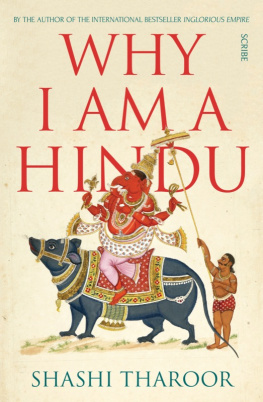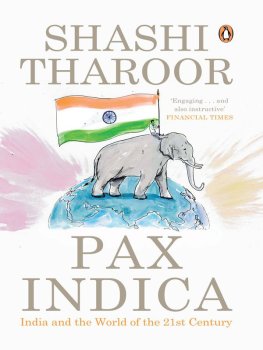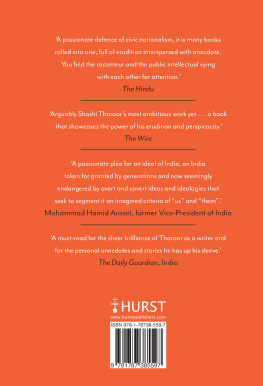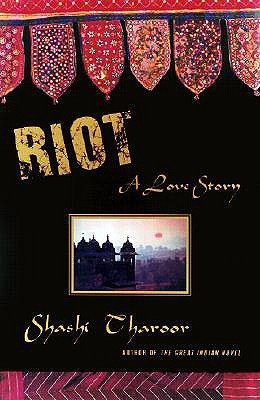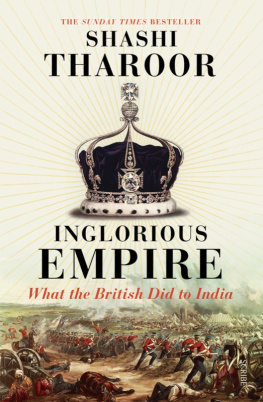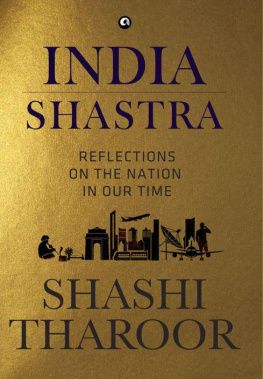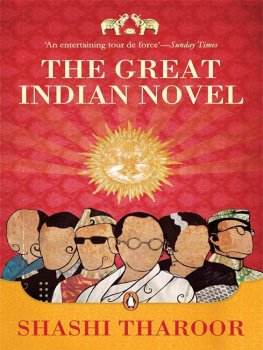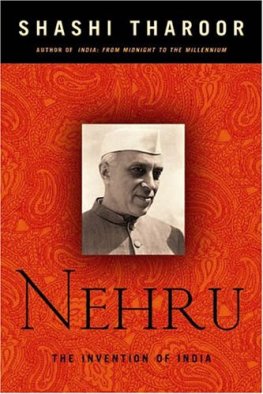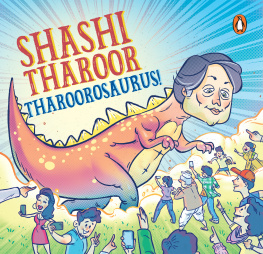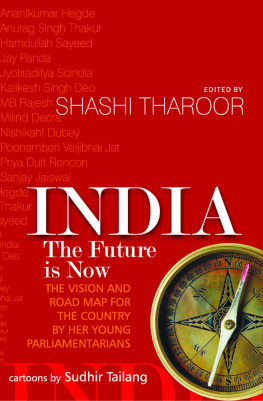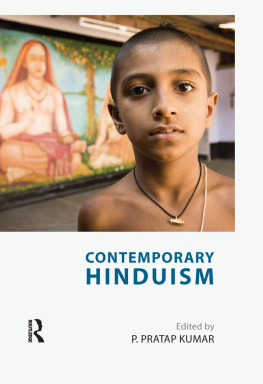
WHY I AM A HINDU
Shashi Tharoor served for twenty-nine years at the UN, culminating as Under-Secretary-General. He is a Congress MP in India, the author of fourteen previous books, and has won numerous literary awards, including a Commonwealth Writers Prize. Tharoor has a PhD from the Fletcher School, and was named by the World Economic Forum in Davos in 1998 as a Global Leader of Tomorrow.
Scribe Publications
1820 Edward St, Brunswick, Victoria 3056, Australia
First published by C. Hurst and Co. (Publishers) Ltd., London 2018
Published in Australia and New Zealand by Scribe 2018
This edition is published by arrangement with Hurst and Co.
Copyright Shashi Tharoor 2018
All rights reserved. Without limiting the rights under copyright reserved above, no part of this publication may be reproduced, stored in or introduced into a retrieval system, or transmitted, in any form or by any means (electronic, mechanical, photocopying, recording or otherwise) without the prior written permission of the publishers of this book.
The moral right of the author has been asserted.
9781925713534 (ANZ edition)
9781925693355 (e-book)
A CiP record for this title is available from the National Library of Australia.
scribepublications.com.au
for my mother
Lily
Tharoor
whose devotion
is untainted
by her scepticism
What thing I am I do not know.
I wander secluded, burdened by my mind.
When the first-born of Truth has come to me
I receive a share in that self-same Word.
Rig Veda , I.164.37
May we not anger you, O God, in our worship
By praise that is unworthy or by scanty tribute.
Rig Veda , II.33.4
May He delight in these my words.
Rig Veda , I.25.18
CONTENTS
PART I
MY HINDUISM
PART II
POLITICAL HINDUISM
PART III
TAKING BACK HINDUISM
PREFACE AND ACKNOWLEDGEMENTS
I wrote this book for two main reasons. The first was to try and understand for myself, and for whoever else was interested, the extraordinary wisdom and virtues of the faith I have lived for over six decades, a faith that I have tried to absorb through beliefs and practices handed down to me by my father and others, my own observations, as well as an extensive reading of the scriptures in translation and numerous scholarly treatises. The second reason I wrote this book was to show that the intolerant and often violent forms of Hindutva that began to impose themselves on the public consciousness of Indians in the 1980s went against the spirit of Hinduism, that most plural, inclusive, eclectic and expansive of faiths.
I am neither a Sanskritist nor a scholar of Hinduism and did not set out to write a scholarly exposition of the religion. Mine is a laymans view of Hinduism, and my exposition seeks to give the reader an overview of the faith as I understand it, as well as accessible summaries of its main features. As will be apparent, I have relied on some of its greatest teachers and adepts to explain its essence. My narrative weaves between personal witness and an attentive reading of the relevant scriptures and academic texts. I seek to bring together ideas of Hinduism from ancient texts, their development by many thinkers, and the practices and the challenges of Hindutva ideology. My approach is to present both the ancient texts of Hinduism and the modern beliefs of Hindutva descriptively and on their own terms, rather than through the theoretical approaches of historians, theologians and social scientists. In this way I seek to arrive at what I hope the reader will find is a lucid and reflective account of one of the worlds oldest and greatest faiths and its contemporary existence.
But I do not pretend to offer a comprehensive view of Hinduism: that would go well beyond the space and scope of this book. Instead, I describe aspects of Hindu thought that matter to me, question practices I am less enthusiastic about, outline Hinduisms capacity to grow and reform and be revitalised for subsequent generations, summarise the history of Hinduism in India and provide a feeling for what being Hindu means in a multi-religious country. In the process I devote as much space to the ideological contestations and political challenges swirling around the faith today as I do to its timeless metaphysics.
The book is divided into three sections. The first section, My Hinduism, looks at every aspect of the religionits principal schools, tenets, teachers, and teachings, as well as some of its more questionable social practices. The second section, Political Hinduism, explains the ways in which political leaders, strategists, thinkers and their religious allies have attempted to hijack the faith for their own ends. The third section, Taking Back Hinduism, talks about how we might free Hinduism from the excesses and perversions it has been subjected to, and restore it to its truest essence, which in many ways is that of an almost ideal faith for the twenty-first-century world.
To some readers, my titleWhy I am a Hindubegs the question of who really is this I that I refer to. Is it the thoughtful Hindu layman, the product of a modern English-language education in contemporary India, who is interrogating himself about the faith to which he claims adherence? Or is it the politician steeped in the issues of the day, who is writing with a sense of urgency and despair conditioned by the experience of being called anti-Hindu by those who understand far less of the faith but are inflamed by their own ideological certitudes? My claims about being Hindu are undoubtedly mediated by political contestations around the public expressions of Hinduism by those who see it as a badge of identity more than a system of transcendental beliefs. But where I disagree with them, I do so not as a secularistor as they would allege, a pseudo-seculariststanding outside the faith, but as a believing Hindu who seeks to challenge them from within the bounds of the religion to which we both claim allegiance.
In some ways I am guilty of the old Indian failing of trying to depict the elephant by describing its tail, tusk, girth and so on. As a result I can at best approximate a number of truths in my effort to describe the unknowable whole truth. Hinduism is uniquely difficult to encapsulate for reasons I describe in my opening chapter: no single founder or prophet, no organised church, no single holy book, and so on; the faith is almost Wikipedia-like in the authorial diversity of its scriptures and tenets. The metaphors used by scholars to describe Hinduism have ranged from the banyan tree and the jungle to a kaleidoscope and even a pan of lasagne. One scholar has pointed out that Hinduism can stand for a civilisation as Hellenism does, and also for a faith as Judaism does; political ideologues in the mid twentieth century insisted it also stood for a race of people embraced by its beliefs. But isnt it also true that our Indian understanding of what religion means has been so drastically affected by colonisation, secularisation, modernity and interaction with global currents, that our own way of conceptualising our native conglomeration of tradition, belief and faith is irretrievably lost?
I cannot be sure, and yet I would argue it does not matter. Some might suggest that this book is an exercise in attempting to fit something unwieldy and unclassifiable into terms an English-speaking twenty-first century reader can understand. Would what we call today Hinduism be recognised by Yajnavalkya (mentioned in the Upanishads, as distinct from the putative author of the Yajnavalkya-smriti , mentioned later) or even Adi Shankara who reinterpreted the same faith nearly 2,000 years later? In essence, can todays Hinduism be divorced from the journeys that this aggregate of faiths took over three millennia of enquiry and exploration, resistance to assault and creative reform? Is it even possible, a thoughtful friend asks me, to think of Hinduism as pristine and thus implicitly to say I am Hindu without acknowledging that what one means is not some eternal category of belief but a set of self-descriptors that is contingent on history?
Next page
